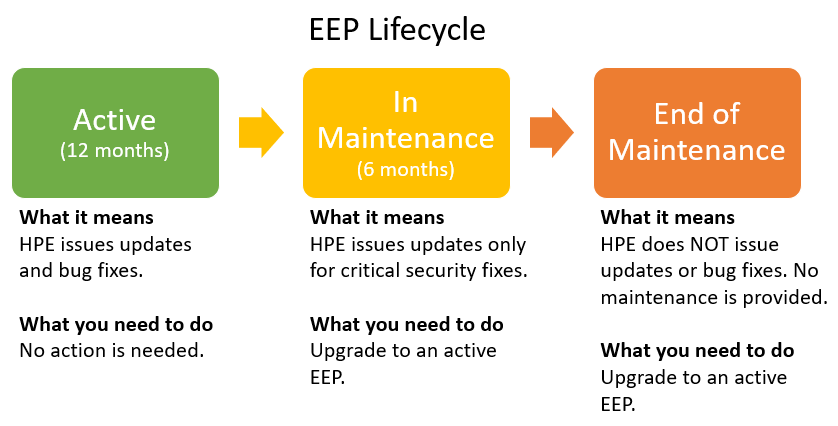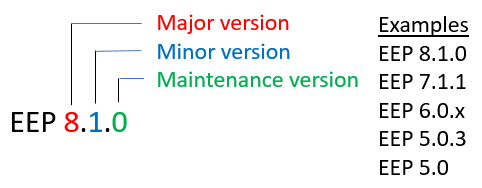Understand the EEP Lifecycle
This page describes the EEP lifecycle and defines the lifecycle stages, which are Active, In Maintenance, and End of Maintenance.
EEP Lifecycle Stages
HPE periodically releases new ecosystem components as ecosystem packs (EEPs). Each EEP is supported for 18 months. When new EEPs are released, older EEPs transition to In Maintenance or End of Maintenance. Each EEP therefore has its own lifecycle.
- Active (12 months)
- In Maintenance (6 months)
- End of Maintenance
The lifecycle stage determines if HPE issues updates and bug fixes for the EEP, which are reflected in changes to the major, minor, and maintenance versions of the EEP:

To view the current lifecycle status for every EEP, see EEP Support and Lifecycle Status.
Support and the Lifecycle Stages
| Support Activity | Notes | Lifecycle Stage | ||
|---|---|---|---|---|
| Active | In Maintenance | End of Maintenance | ||
| Proactive Maintenance (Minor, Maintenance, Patch) | Includes proactive fixes for security vulnerabilities, critical bugs, and other issues. | Yes | No | No |
| Reactive Maintenance (Escalation Support + Patch) | Requires the user to open cases resulting in tactical fixes for critical bugs, where backporting is feasible. | Yes | Yes1 | No |
| Assisted Support (Usage / Debug Support) | Does not include patch fixes. | Yes | Yes | No |
1Includes fixes for critical bugs and CVEs reported to Support. Does not include documentation updates.
EEP Versions
In HPE Ezmeral Data Fabric interfaces and documentation, Ecosystem Pack (EEP) versions are expressed as a dot-separated string of numbers having two or three places. For example:

| A Change to This EEP Version | Typically Includes | For Example |
|---|---|---|
| Major version | A new EEP series that supports a new major, minor, or maintenance version of core. | EEP Support and Lifecycle Status shows how EEP major versions change when new versions of core are introduced. |
| Minor version | A significant change in features or APIs but no change in support for the current core version. | EEPs 6.0.1 and 6.1.0 both support Release 6.1.0, but EEP 6.1.0 introduced new HPE Ezmeral Data Fabric Database features, such as the C# and Go OJAI clients, as well as new features for ecosystem components (Flume, Oozie, Tez, and Apache Kafka). EEP 6.2.0, which also supports Release 6.1.0, introduced new ecosystem component versions (Hue, Impala, Spark) and updated some components (Oozie and Hive). |
| Maintenance version | Bug fixes only. EEP maintenance versions do not add new features or API changes and are backward compatible in the same EEP series. | EEPs 5.0.3, 5.0.2, and 5.0.1 added bug fixes to the EEP 5.0.x line while preserving compatibility with Release 6.0.1. |
Notification of Changes in Support for Released EEPs
To notify users about changes in EEP support, HPE issues periodic support advisories. When EEPs are deprecated or discontinued, users of those EEPs are encouraged to upgrade to newer EEPs. For more information about support advisories, see Security Vulnerabilities and Support Articles in the HPE Support Center.